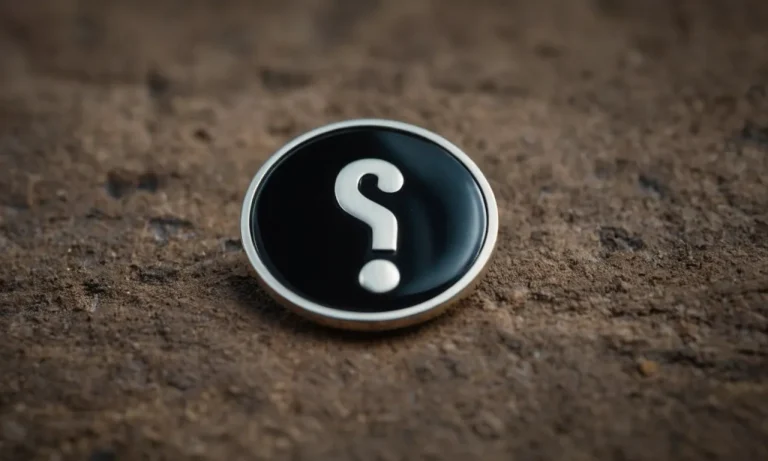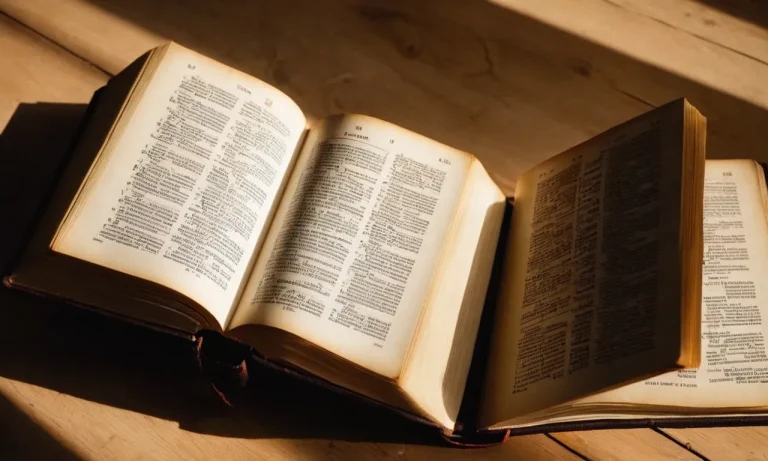Who Did David Kill In The Bible?
King David is one of the most well-known figures in the Bible, famous for defeating the giant Goliath when he was just a shepherd boy. However, he also engaged in many battles and killings as his power and influence grew.
If you’re short on time, here’s a quick answer to your question: David killed Goliath the Philistine giant as a youth, and later commanded the deaths of many enemies in conquest and civil war, including Saul’s son Ish-Bosheth and members of Saul’s family line.
In this comprehensive article, we will explore David’s major killings that are documented in detail within the books of Samuel, Kings, and Chronicles in the Old Testament. We will cover the reasons and repercussions behind these acts of violence, including David’s slaying of Goliath, Saul, Saul’s family members, David’s rebellious son Absalom, and more.
By the end, you will have a chronological understanding of David’s most significant killings according to the Bible.
David Kills Goliath
David Enters Battle with the Philistines
The story of David and Goliath begins when the Philistine army gathers for war against Israel (1 Samuel 17). The two armies faced each other across the Valley of Elah. For 40 days, the Philistine champion fighter Goliath stepped forward and challenged the Israelite army to send out a champion of their own for a duel.
But no Israelite soldier had the courage to face the giant nearly 10 feet tall.
One day, David was sent by his father Jesse to deliver food to his three oldest brothers who were with King Saul’s troops preparing for battle. When David arrived, he was surprised to see the Israelite army cowering in fear of Goliath’s taunts and challenges.
David asked, “Who is this uncircumcised Philistine that he should defy the armies of the living God?” (1 Samuel 17:26). David’s bravery caught Saul’s attention, and he agreed to let the young shepherd boy face the giant.
Goliath’s Challenge
Goliath was a champion fighter of the Philistines from Gath, nearly 10 feet tall and wearing armor that weighed over 125 pounds! His challenge to the Israelite army was arrogant: “Choose a man for yourselves, and let him come down to me.
If he is able to fight with me and kill me, then we will be your servants. But if I prevail against him and kill him, then you shall be our servants and serve us” (1 Samuel 17:8-9).
Goliath issued this challenge twice a day for 40 days, but not a single Israelite soldier had the courage to face him. They were “dismayed and greatly afraid” (1 Samuel 17:11). But young David, after hearing Goliath’s defiance of God’s people, steps forward and says “who is this uncircumcised Philistine, that he should defy the armies of the living God?”
(1 Samuel 17:26).
David’s Trust in God
After David volunteered to fight Goliath, King Saul tried to give David his armor and sword. But David refused, saying he had not tested Saul’s armor and preferred to face Goliath with weapons he was accustomed to using (1 Samuel 17:38-39).
Instead, David took only his staff, slingshot and 5 smooth stones from a brook.
When Goliath saw the youthful and small David coming against him, he disdained him, saying, “Am I a dog, that you come to me with sticks?” (1 Samuel 17:43). But David did not fear the giant because he trusted in God, saying, “You come to me with a sword, with a spear, and with a javelin.
But I come to you in the name of the Lord of hosts, the God of the armies of Israel, whom you have defied” (1 Samuel 17:45).
The Slaying of Goliath
As the Philistine champion moved closer to attack, David quickly ran toward the battle line to meet him. Reaching into his bag, David took out a stone and slung it, striking Goliath directly in the forehead. The stone sank into the giant’s head and he fell facedown on the ground.
David then took Goliath’s own sword and cut off his head (1 Samuel 17:49-51). When the rest of the Philistines saw their great hero had been killed, they turned and fled.
David’s trust in God and courage to face a formidable enemy became a legendary story throughout Israel. He went from an obscure shepherd boy to a hero and eventually the King of Israel. As David later reflected, “The Lord, who delivered me from the paw of the lion and from the paw of the bear, He will deliver me from the hand of this Philistine” (1 Samuel 17:37).
His faith in God’s help was rewarded with a great victory.
David’s Forces Kill Saul
David’s Respect for Saul
Even though Saul repeatedly tried to kill David out of jealousy, David always respected Saul as the anointed king of Israel (1 Samuel 24:6). When David had opportunities to kill Saul, he refrained from doing so because he did not want to lift his hand against the Lord’s anointed.
The Deaths of Saul and his Sons
After David spared Saul’s life, there was still bad blood between them. Later on, the Philistines attacked Israel’s army and killed Saul’s three sons, including his heir apparent Jonathan, who was David’s dear friend (1 Samuel 31:2).
Saul was critically wounded in the battle and ended his own life by falling on his sword so that the Philistines could not abuse him.
David Punishes the Messenger
When David heard the news about Saul and Jonathan’s deaths from an Amalekite messenger, he did not rejoice but mourned instead. However, when the messenger claimed that he had personally killed Saul at Saul’s own request, David did not believe him and had the man executed for daring to harm the Lord’s anointed king (2 Samuel 1:1-16).
While David himself refrained from violence against Saul, it was ultimately Saul’s battle against the Philistines that cost him his life. David made sure that no one who claimed to have killed the Lord’s anointed king would go unpunished.
David Orders the Killing of Ish-Bosheth
Ish-Bosheth Becomes King
After Saul and Jonathan were killed in battle against the Philistines, Ish-Bosheth became king over the northern tribes of Israel. As Saul’s only remaining son, Ish-Bosheth was chosen by Abner, the commander of Saul’s army, to rule over Israel and continue Saul’s dynasty.
However, David had already been anointed king by Samuel years earlier and established himself as king over Judah in Hebron. This divided the nation of Israel between the north led by Ish-Bosheth and the south led by David.
Ish-Bosheth reign lasted just two years and was characterized by conflict with David’s kingdom. Despite being king, Ish-Bosheth seemed to wield little power as Abner was the one commanding the armies and subduing enemies. Ish-Bosheth also faced betrayal from among his inner circle.
The Assassination by David’s Men
The assassination of Ish-Bosheth is recorded in 2 Samuel 4. Ish-Bosheth was resting in the heat of the day in his house when two captains named Baanah and Rechab entered and stabbed and killed him. The text says that Ish-Bosheth’s assassins were from the tribe of Benjamin like Saul and Ish-Bosheth himself.
These men associated themselves with the house of Saul.
After the murder, Baanah and Rechab decapitated Ish-Bosheth and travelled through the night to David’s court in Hebron. They presented Ish-Bosheth’s head to David hoping for a reward. However, David rebuked them harshly for killing an innocent man. He then ordered them killed for their crime.
David Punishes the Killers
Upon hearing Baanah and Rechab recount Ish-Bosheth’s murder, David declared that the assassins deserved severe punishment for such an atrocious act. Though Ish-Bosheth was his rival, David respected him as the Lord’s anointed king and knew he did not deserve such a death.
David also likely wanted to signal that such tactics would not help them defeat Ish-Bosheth’s kingdom.
As punishment, David ordered Baanah and Rechab’s hands and feet to be cut off before hanging them from pool in Hebron. This served as a stark warning that such wickedness against God’s anointed kings would be avenged.
It also reinforced David’s moral authority as he built his case for reuniting all Israel under his kingship.
Killings During David’s Flight from Absalom
Absalom Rebels against David
Absalom was one of King David’s sons who rebelled against his father and tried to seize the throne. After winning over the hearts of many Israelites, Absalom declared himself king in Hebron. When David heard the news, he fled Jerusalem along with his household and supporters (2 Samuel 15:13-14).
This forced exile marked the beginning of some difficult times for David.
The Slaying of Amasa
During David’s escape from Jerusalem, one of his mighty men named Abishai wanted to kill Shimei, a member of Saul’s family who had cursed David. But David spared his life (2 Samuel 16:5-14). Later, after Absalom’s death, David appointed Amasa as commander of his army in place of Joab.
When Amasa was slow to gather the troops, David told Abishai to take his brother Joab and pursue after Sheba who had revolted against David’s return. When they met Amasa, Joab slyly assassinated him with a sword (2 Samuel 20:4-13).
Though David had not directly ordered it, Joab’s act removed a potential rival.
Further Death in Battle
After Amasa’s death, Joab and Abishai continued their pursuit of the rebel leader Sheba. When they reached the city of Abel-beth-maacah, they appealed to the citizens to hand over Sheba’s head. A wise woman convinced the city elders to behead Sheba, and they threw his head over the wall to appease Joab (2 Samuel 20:14-22).
Though David had not wanted further bloodshed, Joab’s zeal to quell the rebellion led to more lives lost. However, David chose not to punish Joab and allowed him to remain as commander, valuing his loyalty.
Deaths in Retribution for Saul
Saul’s Broken Oath
After Saul’s death, David faced a difficult situation. Saul had previously made an oath not to kill off David’s lineage, but David felt Saul had broken that oath by relentlessly pursuing him. David may have seen the deaths of Saul’s sons as justice or retribution for Saul breaking his word.
The Execution of Saul’s Sons
After becoming king, David executed some of Saul’s remaining sons who could potentially threaten his reign (2 Samuel 21:1-14). Seven of Saul’s sons were handed over to the Gibeonites and killed. This act eliminated rival claimants to the throne but was also likely intended as further retribution for Saul’s misdeeds.
Justice or Cruelty?
Scholars debate whether David’s actions represent justice or unnecessary cruelty. Some argue David was ensuring security and fulfilling Saul’s broken oath. Others criticize David for excessive violence.
Ultimately, in the context of the brutal ancient world, his actions likely inspired fear and discouraged future threats.
Conclusion
In reviewing David’s major killings documented in the Bible, we see a complex picture of a powerful warlord who engaged in much bloodshed to establish and maintain control of the kingdom of Israel.
Yet David was also considered a righteous servant of God whose actions reflected divine will. His faith and courage in facing the giant Goliath became legendary. The violence attributed to David must be understood in its proper historical context of warfare and justice in the ancient Near East.
Whatever one’s final judgment of King David’s legacy, his killings, whether brave or cruel, left an indelible impact upon the kingdom of Israel and Jewish history that endures to this day.








